Back in 2014, when my friend Kristin still lived in North Carolina,
I went to visit her for a few days. We went to thrift stores and sight seeing, I made her watch the "Saved by the Bell" Lifetime movie, and while we were at the only comic store that she knew of in her city (it somehow never occurred to either of us to google and see if there were others), I bought the two issue "Lois Lane" miniseries from 1986.
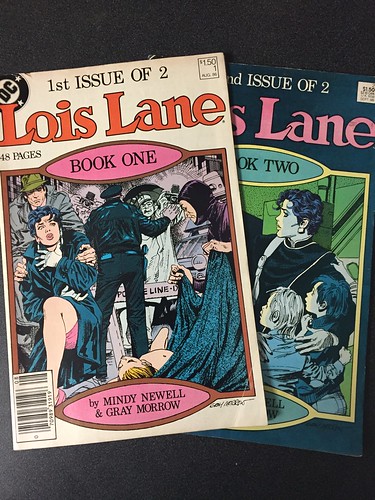
This miniseries is important to the publishing history of Lois Lane in a few different ways: it's her first miniseries, and it is the first Lois Lane comic that doesn't also have Superman's name on it, despite there having been over a hundred issues of her own series. That one was technically titled "Superman's Girlfriend, Lois Lane".
This miniseries is also important because it is the weirdest, darkest Lois Lane story ever published.
I honestly can't believe DC Comics published this at all, and I get the impression that they initially didn't want to. It seems like something they commissioned and paid for, and then decided to shelve for a while. I don't know for sure that I'm right, but here's why I think so:
1) It was published in 1986, but takes place during the plot structure of the Superman books in 1983. Specifically, it follows almost directly out of "Superman" #388, and picks up a subplot in that book. Why write a miniseries about a subplot from three years earlier?
2) It was clearly written to be 4 issues long, which was the size of most DC miniseries at the time, but was then published as two double sized issues, with four chapters total, that both stop on a cliffhanger exactly halfway through each issue that is immediately resolved on the next page.
3) This miniseries was never referenced in comics again.
While this book was being published and sold, DC was already in the process of publishing the "Crisis on Infinite Earths" 12 issue maxi-series, which rewrote and streamlined their entire continuity. One effect of that rewrite was that the Superman books were rebooted entirely, which means that DC was publishing this book even while they knew it would immediately be wiped from their continuity. Everything about this just seems like they paid someone to write it, saw how badly the story doesn't actually work, let it sit on a shelf for a few years, and then said, "Hell, we might as well try to make some money out of it anyway," and dropped it onto the news stands.
Given that much buildup, you're probably wondering what's so terrible about this story, and that's a little harder to explain. It was clearly written with the best of intentions, and was intended to be a serious, "real world issues" book of the type that
DC had published before with varying degrees of success. This book is a little different, though, because it not only tries to be ultra-serious, but it's also one of DC's earliest attempts at publishing the kind of grim and gritty work that independent publishers and their competition had already been doing. It slightly predates "Watchmen" (the second issue of this series has an ad for the upcoming "Watchmen" series), predates the Joker beating the second Robin to death, and came out at a time when DC was more or less seen as the CBS network of comics: old, kind of stuffy, and mostly filled with the kind of stories your parents might like.
Lois Lane, whose comic for decades involved scheming to get Superman to marry her, turning into monsters by accident, and getting caught up in wacky schemes, wasn't quite the right character for a super-serious story about child abduction and murder, but damn, they sure did try.
Our story opens with everyone at the Daily Planet newspaper worried about Lois, and pretty much assuming she was in the middle of a breakdown. She had recently broken up with Superman, and had recently blown a big story about the Middle East. Lois was supposed to be conducting a joint interview with fighting Middle Eastern leaders, but the peace talks fell apart. At the same time, Lois and Superman's relationship fell apart, so he flew her off somewhere (at her request) to think about her life. While she was doing that, the peace talks suddenly got back on track, and since nobody could find Lois, Lana Lang flew in and conducted the joint interview for her job on the nightly news, where Clark Kent was her co-anchor and boyfriend.
In the previously mentioned "Superman" #388, Lana is collecting her accolades from her colleagues at an office party:

when Lois arrives to congratulate her. Lana responds in typical Lana fashion by throwing
some of the shade that she's so famous for:
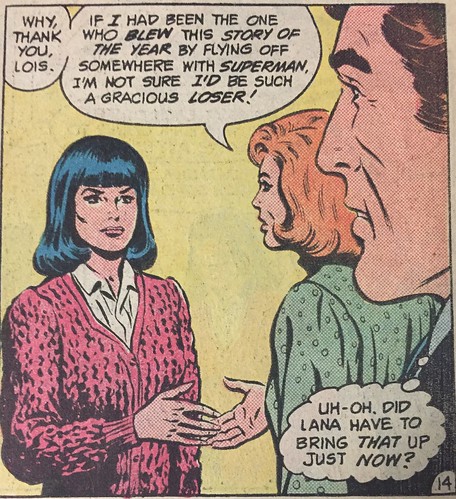
Lois responds by throwing punch:
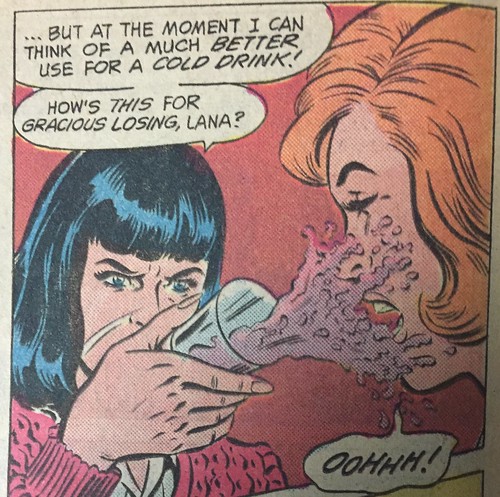
and Lana responds to that by actually trying to drown Lois in punch:
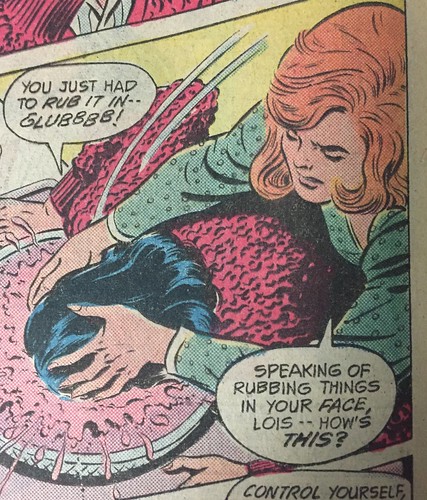
They end up in a knock down, drag out fight in front of all of their coworkers:
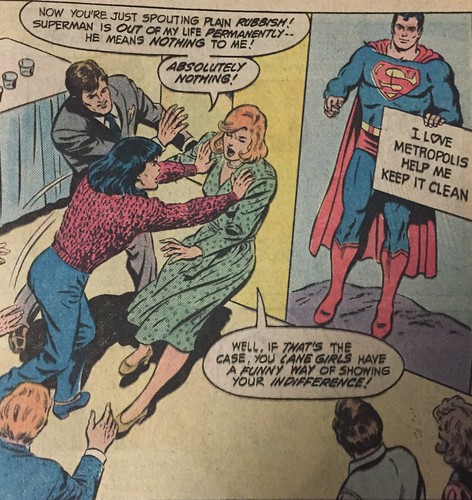
and then Lois is suddenly clawing at a Superman recycling poster and weeping:
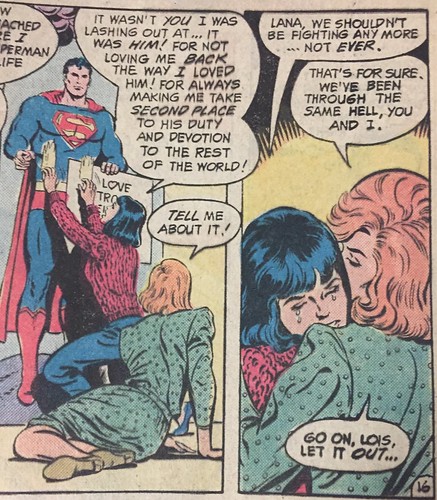
Again, this took place in front of everyone from the newspaper department and everyone from the TV news division. That's why everyone is convinced that Lois may be cracking up: because maybe she is.
And then Lois' miniseries starts, and things go fully off the rails. The story starts with Lois pushed to the back pages of the newspaper, and trying to go on dates with guys who aren't Superman. Our story begins with Lois ditching her date, and taking his car, to follow some police cars to the docks:
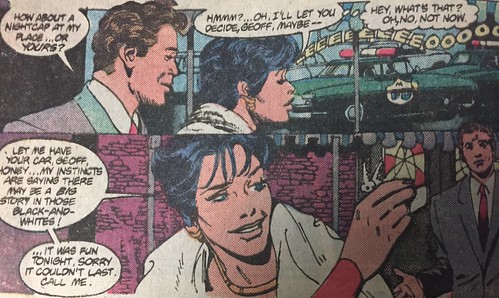
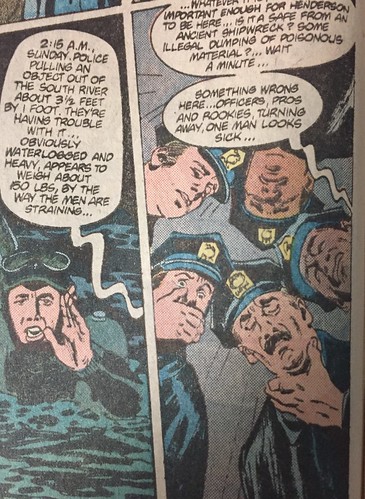
At this point, there's still a chance that we're about to end up in a regular Lois Lane story. "Maybe it's treasure from a shipwreck!" Yes, maybe! Or, maybe not.
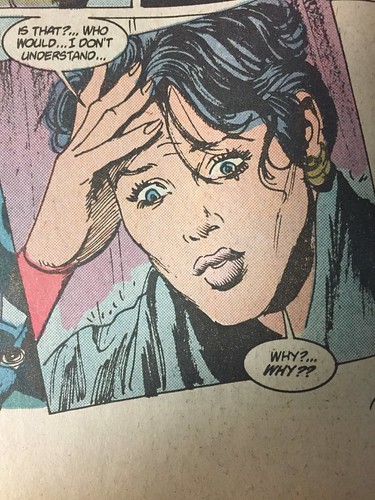
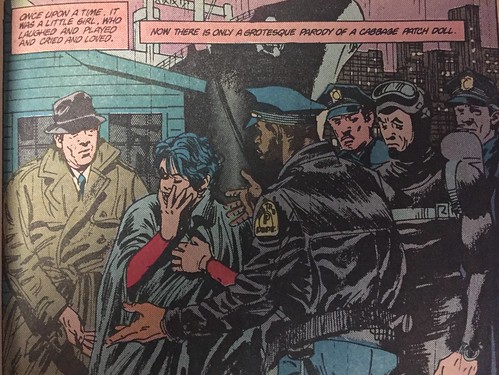
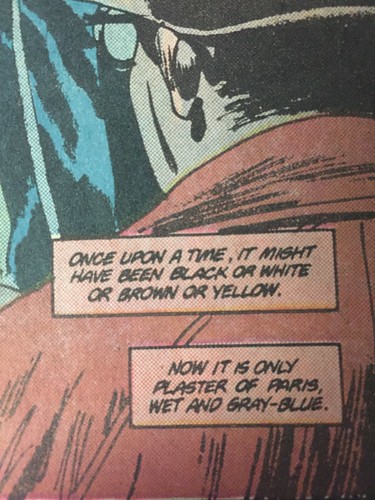
Again, this could have been a very serious story about child abduction, but the writing goes so far over the top that it lands somewhere on the other side. "A grotesque parody of a cabbage patch doll." Just let that wording sink in for a minute.
Lois is, understandably, shaken by this.
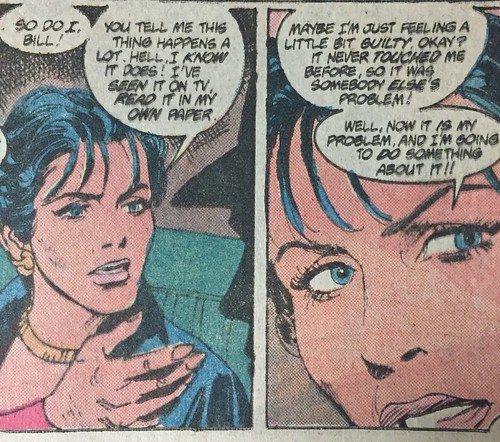
Lois is, apparently, also a former Republican voter, giving the familiar "I never cared about this problem until it was my problem" that anybody who watches the news has heard dozens of times. She heads home to get some sleep before work, and the book decides to introduce a subplot that goes nowhere: Lois' sister Lucy, a flight attendant, tries to get in touch with her between planes.
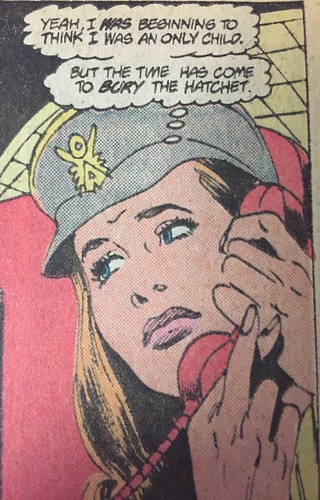
This will come up several times during the story, but Lucy's presence will never actually be important to the story.
Lois goes to work the next day, determined to write a hard hitting investigative piece about missing and exploited children, and the editor is having none of it. Lois no longer commands the front page after blowing the Middle East story, but he's willing to throw her a bone and let her write something for Janice, the Features and Lifestyles editor. Lois responds in predictable Lois fashion:
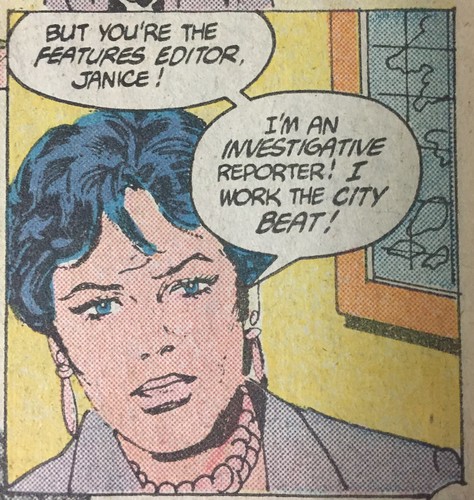
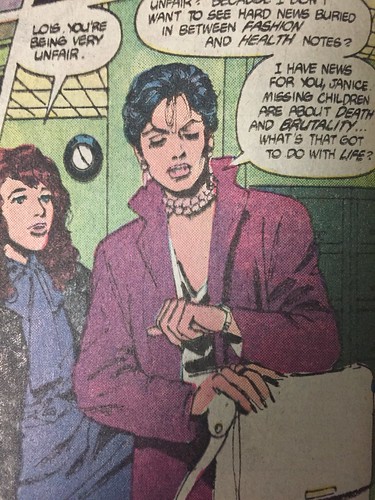
"Your section of the paper is garbage, Janice." She doesn't actually say that, but she might as well. Janice, rather than firing her, decides to let Lois go work on her story anyway, and Lois immediately heads out to interview the head of a child-finding agency. Again, the writing tries so hard to make this lady seem gritty and real world that it's almost laughable:
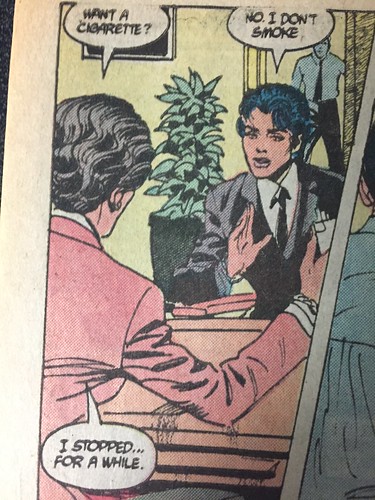
"I stopped, for a while..." and then she launches into two or three pages of the terrible things she's seen, the missing kids, the families getting called about bodies, and the kids who are never found at all. Lois takes lots of notes, especially when a family whose toddler daughter was just kidnapped at the hamburger stand comes rushing in, weeping and blaming each other.
Meanwhile, Lucy is still trying to get in touch with Lois, and goes to Clark and Lana's apartment.
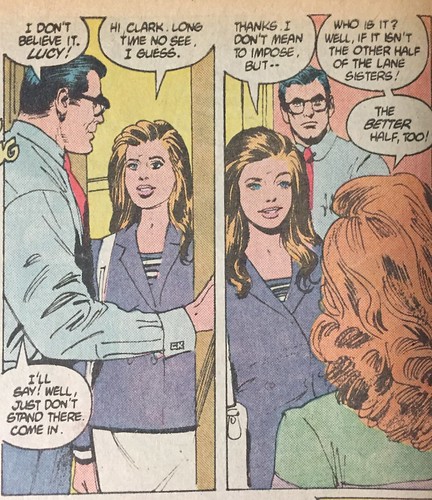
Lana just can't help those shady side comments. She and Clark do try to get the sisters in touch:
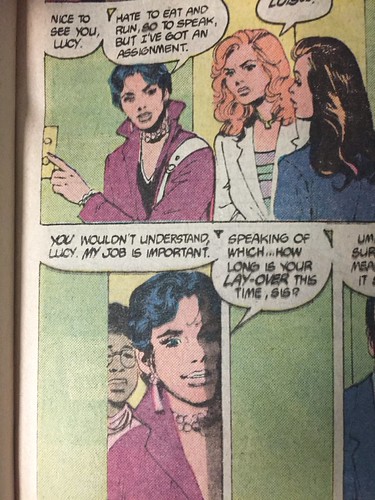
and Lois is as nice to Lucy as she was to Janice. Lana, sensing an opportunity for drama, immediately takes action:
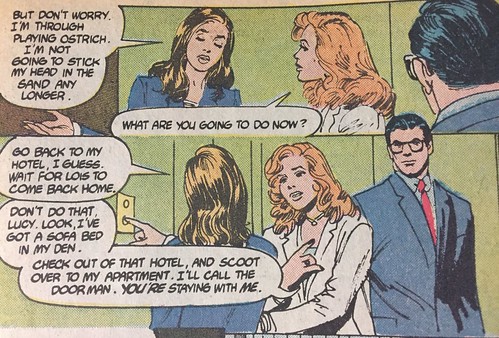
Her motives are predictably Lana-esque:
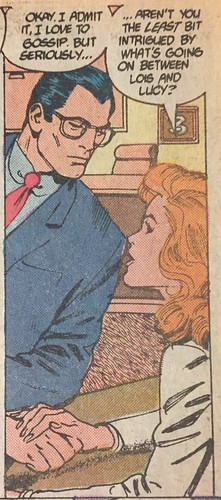
but again, this side plot never goes anywhere. Clark isn't in the mood for it, anyway, because he's worried:
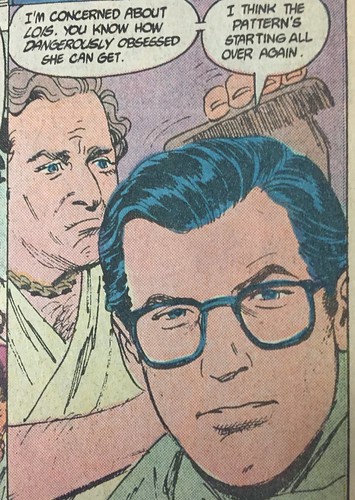
He's also getting his hair combed there because he and Lana are about to do the nightly news broadcast. I assume that, normally, Clark combs his own hair.
After some more investigating, Lois comes home to find that the doorman let Lucy into her apartment, and they have another heated conversation while, weirdly, Lois strips down and takes a bath in front of her sister:
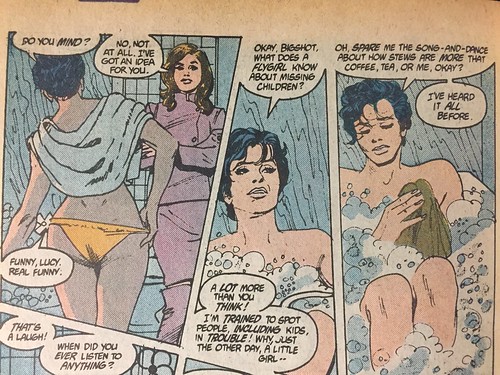
Is this something that sisters do?
Lucy stomps out, and the next morning she and Jimmy Olsen cook up some sort of plan:
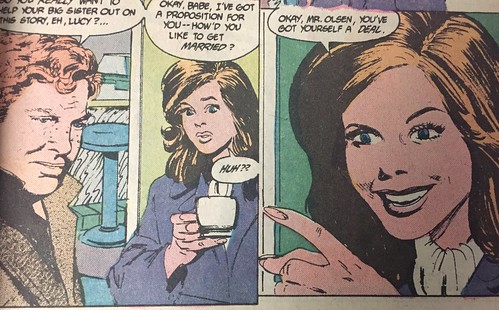
They're going to somehow help Lois with this story by pretending to get married.
Lois is out helping herself, going to interview the mother of a girl who was abducted and then found.
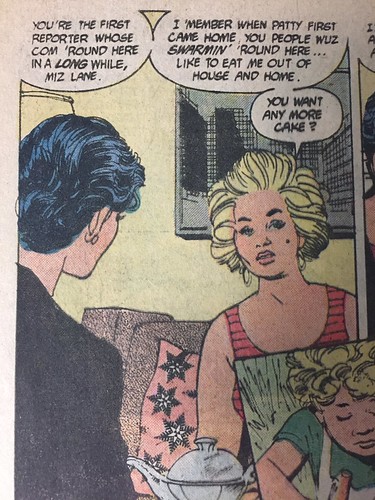
Patty's mom is happy to answer questions, but she also wants to talk to Lois about breaking up with Superman:
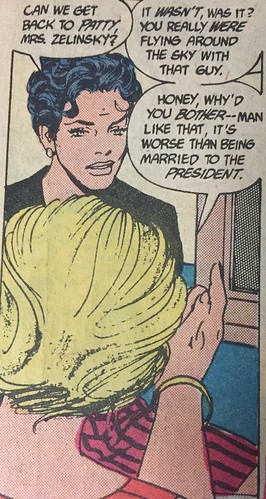
Lois redirects the mother, finally, and we get to their story:
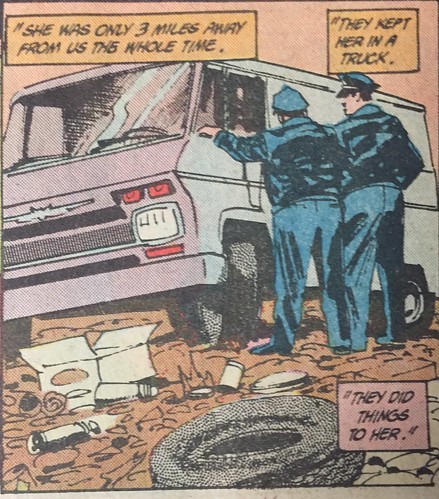
and then, in case you're not sure what they mean by "did things to her", DC goes all the way over the top again:
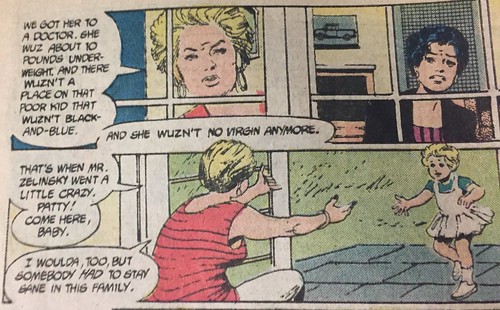
explaining that a toddler "wuzn't no virgin anymore". In a Lois Lane comic. Between some wacky hijinks with Jimmy and Lucy faking a wedding and Lois talking to a stranger about not being in love with Superman. This book veers wildly in tone the entire way through.
Heading back to the office, Lois runs into Lana on the sidewalk out front, and Lana suddenly wants to help:
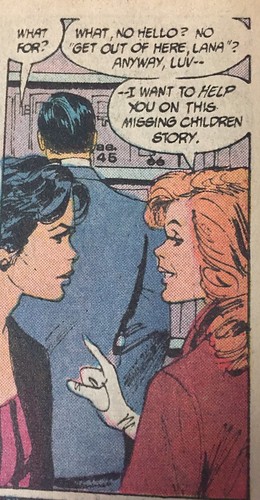
Lois isn't having it.
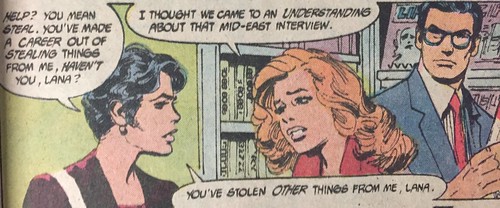
And there we are. This is a super serious, grim and gritty real world story with sad detectives and jaded chain smoking social workers and sexually abused little girls, but now we're about to throw in a few panels of Lois and Lana fighting over Clark. Fortunately, Lana isn't down for it.
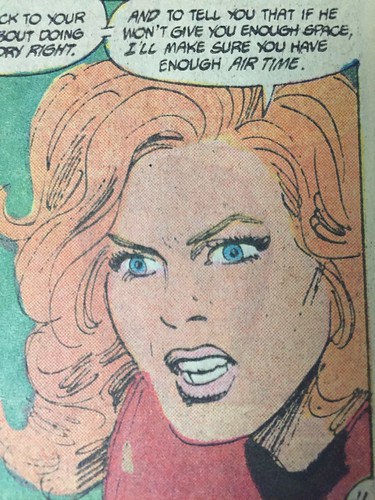
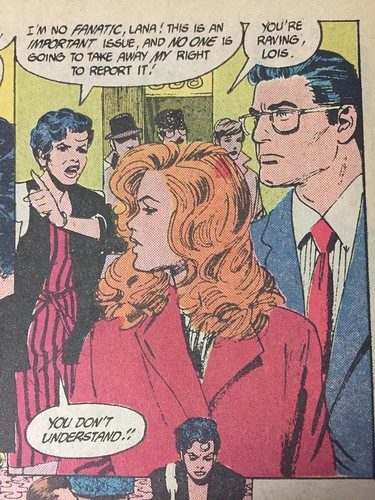
Lois IS raving. She's screaming at Lana in the middle of a sidewalk and Lana, for once, walks away. She, at least, remembers that this is supposed to be a serious comic, and will not lower herself to pulling hair or shoving Lois into traffic. Lois, friendless and alone, heads to a halfway house for troubled teens.
The troubled teens want to talk about her breakup with Superman.
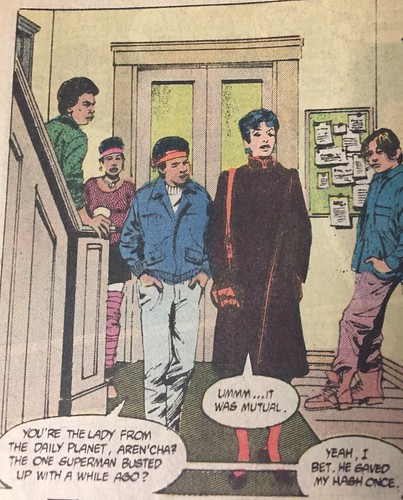
At this point, it's almost hilarious that every stranger on the street wants to discuss her relationship, but as she leaves the halfway house she finds another person on the sidewalk wanting to discuss it:
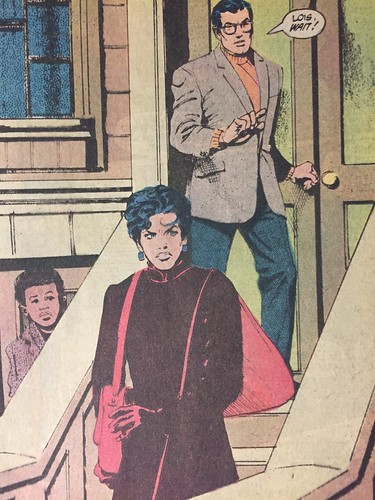
Lois isn't waiting, Clark. She's got a cape and a coat and a purse and no more time for your crap.
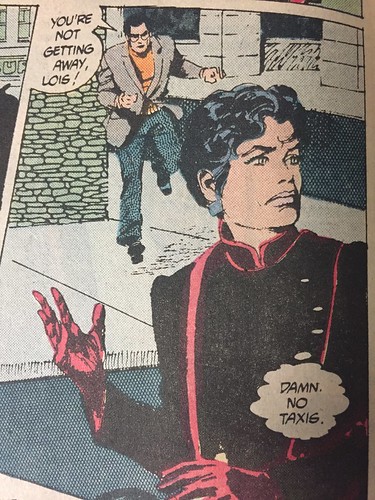
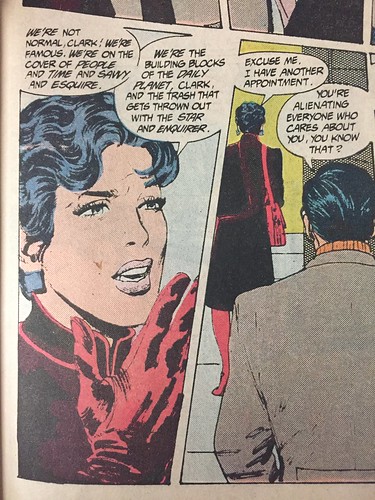
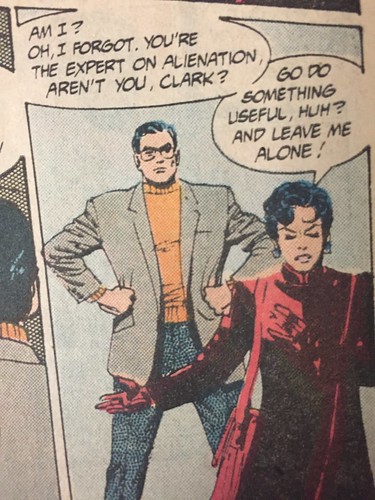
Did I mention that, at this time, neither Lois nor Lana is aware that Clark and Superman are the same person?
Meanwhile, Lucy and Jimmy have turned their fake marriage into a story about... something... to help Lois:
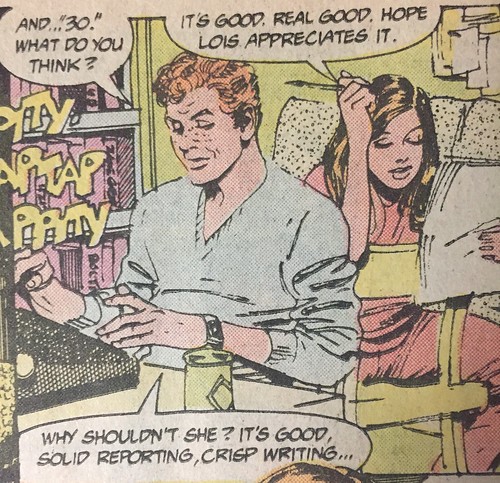
and Lois continues not to have time for them:
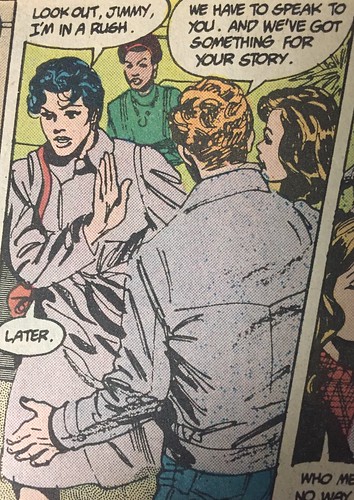
and that's it for that subplot. The book never tells us what the story was about or why it required Jimmy and Lucy to pretend to be married.
On her way to a press conference about another abducted child, Lois runs into Lana, who invites her into the green room for coffee:
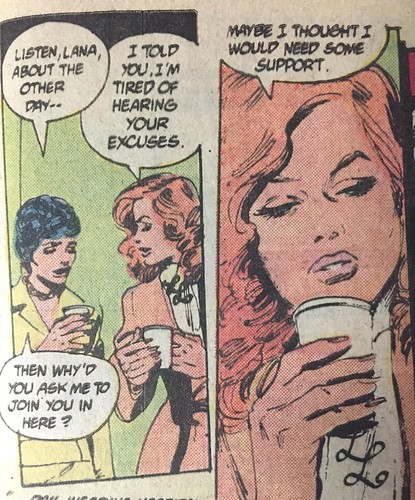
Wait, why does Lana need support? And why does she break down during the police briefing?
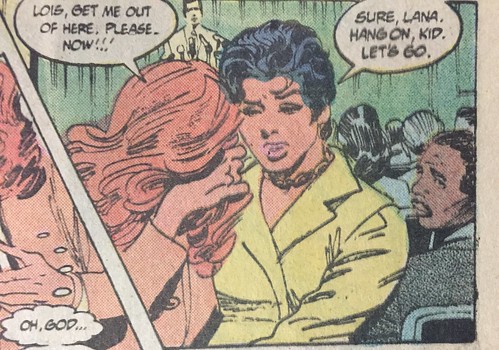
It turns out that Lana got upset when the police mentioned that the baby's ear had been sent in by the kidnappers, and the reason why is where this story goes all the way into bonkers territory:
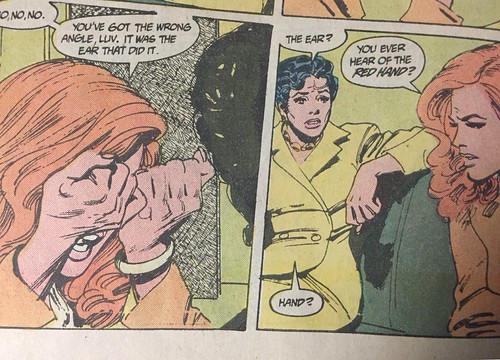

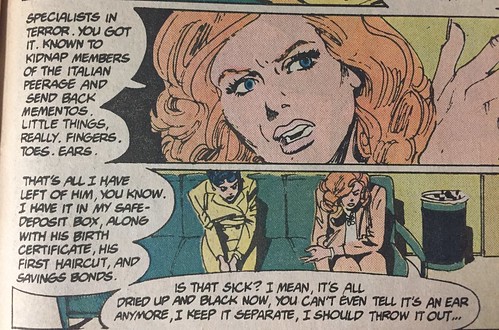
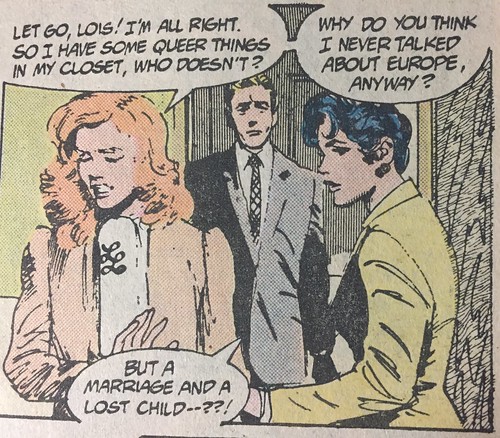
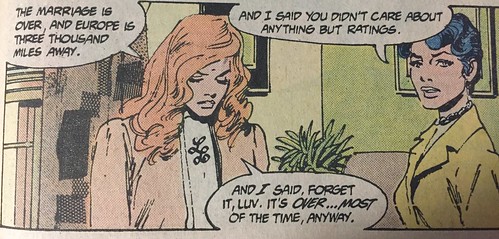
DC Comics decided to use the last four pages of the miniseries to reveal that Lana, while absent for a few years in the Superman comics in the early 1980's, had a secret marriage, had a secretly kidnapped and murdered baby, was keeping the baby's ear in her bank box downtown with her savings bonds because she didn't know what else to do with it,
and then they never referenced any of this in a DC Comic again.
And that's it.
Lois and Lucy make up:
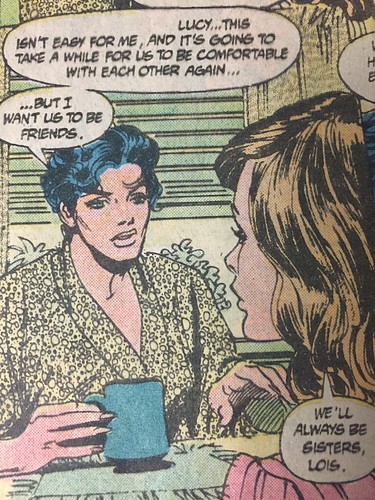
Lois' story gets published, they all go to a funeral for the child from the beginning of the story:
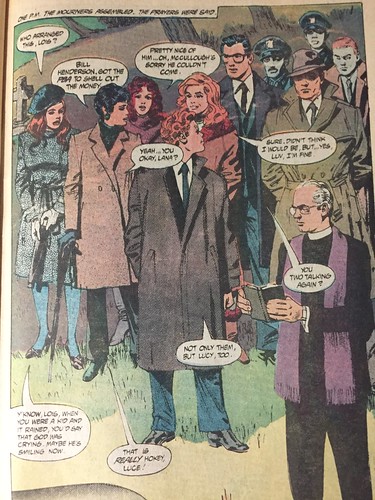
and there's a six month later epilogue showing that the killer was never found:
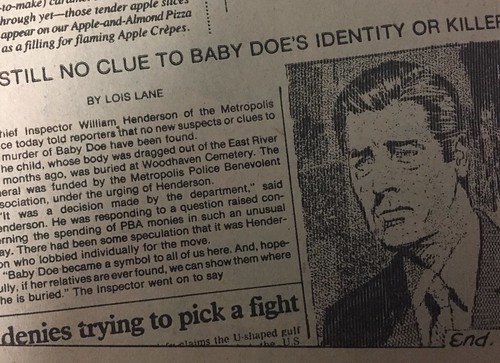
and that's it. The miniseries just ends.
And DC Comics never speaks of it again.

















































